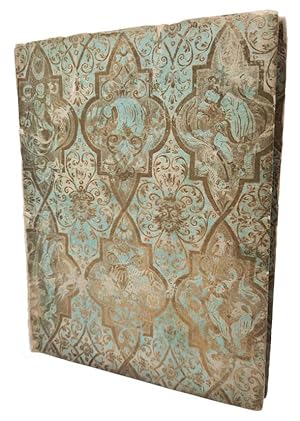Riguardo questo articolo
8vo (227-172 mm). 185, [1] pp. Collation: A-Y4 Z6. With a printer's mark on title-page and p. 76 (Apollo with lyre) plus a large woodcut of Hercules and the Nemean Lion on final page. Contemporary "carta rustica" covered with brocade paper (somewhat chipped along the joints along with a few short tears, spine somewhat discolored). Completely unsophisticated and suitable for exhibition and study. Preserved in a linen cloth protective case. First Edition of Conti's "Il Cesare," a play which Gamba pronounces as "One of the best Italian tragedies," and which is further distinguished by containing THE FIRST ITALIAN REFERENCE TO SHAKESPEARE, and is at the same time "THE FIRST OPINION ON SHAKESPEARE EVER TO BE PRINTED OUTSIDE ENGLAND" (Petrone Fresco). Included also is a fascinating discussion of the Bard's "unruly genius" and the nature of the tragic drama itself. This Italian imprint was likely in Germany at a very early date: covering the original boards is an Augsburg "Chinoiserie" brocade paper, made in 1722 by Joseph Friedrich Leopold (1669-1727); the marvelous brocade features acrobats and an elephant, which according to Haemmerle "rank among the best examples of their kind" (p. 124, illustrated on p. 82). Prefixed to Conti's play (likewise a tragedy based on the life of Julius Caesar) is the author's famous letter to Jacopo Martelli, a portion of which is here translated: "'Sasper (i.e. Shakespeare) is the Corneille of the English, only far more irregular than Corneille, though, like him, he is full of great ideas and noble sentiments. I shall only mention his Caesar here. Sasper makes him die in the third act. The rest of the tragedy is taken up with Mark Antony's speech to the People, then with the wars and the deaths of Cassius and Brutus. Could there be a greater violation of the unities of time, action and place? But the English, before Cato, treat Aristotle's rules with contempt, for the aim of tragedy is to please, and the best is the one which is most successful in this. [.] Such were, I imagine, the views of most Italians, spoilt by Spanish comedies, in the seventeenth century" (pp. 54-55). Conti "is surprised that no one thought of translating the English plays of the time, since 'they are crowded with incident, like the Spanish, while their characters are certainly more natural and more pleasing.' The Histories especially he thinks might have proved most instructive to his countrymen then." (SOURCE: Lucy Collison-Morley, "Shakespeare in Italy," Stratford-upon-Avon, 1916, translating "Il Cesare" p. 54). J.G. Robertson has underlined how Conti's judgement was soon to influence critical opinion both in Italy and the rest of Europe: "The importance of [Conti's] statement is that here, for the first time, we find a critic outside England not merely regarding Shakespeare with respect, but hinting at the possibility of the continental nation learning from him. That Conti's own 'Cesare,' excellent though it is, has nothing Shakespearian about it, does not impair his argument, and his words fell on fruitful ground in both France and Germany." (SOURCE: "The Knowledge of Shakespeare on the Continent at the Beginning of the Eighteenth Century" in: The Modern Language Review, I, 1905-1906; see also Robertson's Studies in the Genesis of Romantic Theory in the Eighteenth Century (Cambridge, 1923) in which Conti's appreciation of Shakespeare is shown to have profoundly influenced the French and German romantic credo. Antonio Conti (1677-1749) was a cultured Venetian abbot who came to London in 1715, attracted by the fame of the Royal Society and the brilliancy of English scientific inquiry. He excelled in mathematics, philosophy, and belles lettres, and was provided with excellent introductions to English scholars and some of the leading scientists of the day, including Newton (see Conti's preface pp. 49-52). London's foul air disagreed with him, and he retired to the country house of the Duke of Buckingham where he was introduced. Codice articolo 4102
Contatta il venditore
Segnala questo articolo
![]()
